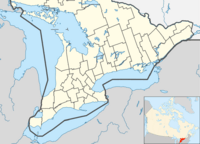Chippewas of Georgina Island First Nation 33A facts for kids
Quick facts for kids
Chippewas of Georgina Island First Nation 33A
|
|
|---|---|
| Chippewas of Georgina Island First Nation Indian Reserve No. 33A | |
| Country | |
| Province | |
| Regional municipality | York |
| First Nation | Chippewas of Georgina Island |
| Area | |
| • Land | 0.01 km2 (0.004 sq mi) |
The Chippewas of Georgina Island First Nation 33A is a special area of land. It is known as a First Nation reserve. This reserve is located very close to the beautiful shores of Lake Simcoe.
This land is one of three reserves that belong to the Chippewas of Georgina Island First Nation. It's like a small island of land within the larger area of Georgina, Ontario. Specifically, it's surrounded by a community called Virginia Beach.
Contents
What is Georgina Island First Nation 33A?
This reserve is a specific piece of land set aside for the Chippewas of Georgina Island. It's a place where members of the First Nation can live and keep their culture alive. It helps protect their heritage and traditions.
Where is the Reserve Located?
The reserve is in Ontario, Canada. It sits near the southern part of Lake Simcoe. It's an "enclave," which means it's a small area completely surrounded by a different territory. In this case, it's surrounded by Virginia Beach.
How is it Separated?
The Chippewas of Georgina Island First Nation 33A is not directly connected to the main part of the Chippewas of Georgina Island reserve. A road called Black River Road separates them. There are also private properties along this road that create a gap.
Who are the Chippewas of Georgina Island?
The Chippewas of Georgina Island are a First Nation people. They are part of the larger Ojibwe group. Their history in this area goes back a very long time. They have deep connections to the land and Lake Simcoe.
What is a First Nation Reserve?
A First Nation reserve is land that is legally set aside for the use and benefit of a specific First Nation. These lands are important for their communities. They help preserve their culture, language, and way of life.
Why are Reserves Important?
Reserves provide a home and a base for First Nation communities. They allow people to live together. They also help maintain their unique traditions and governance. It's a place where their history and future connect.
 | Lonnie Johnson |
 | Granville Woods |
 | Lewis Howard Latimer |
 | James West |


